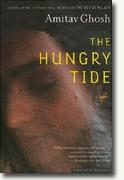The Hungry Tide
Amitav Ghosh
book reviews:
· general fiction
· chick lit/romance
· sci-fi/fantasy
· graphic novels
· nonfiction
· audio books
· author interviews
· children's books @
curledupkids.com
· DVD reviews @
curledupdvd.com
newsletter
win books
buy online
links
home
for authors
& publishers
for reviewers

 |
The Hungry Tide Amitav Ghosh Mariner Paperback 352 pages June 2006 |
|
In his earlier novel The Glass Palace, Amitav Ghosh has King Thebaw of Burma watching the milling crowds at the Rangoon waterfront through his binoculars. Exiled by the British from Burma, Thebaw wonders, “What vast, what incomprehensible power, to move people in such huge numbers from one place to another-emperors, kings, farmers, dockworkers, soldiers, coolies, policemen. Why? Why this furious movement-people taken from one place to another, to pull rickshaws, to sit blind in exile? And where would his own people go, now that they were a part of this empire?”  This single thought, my favorite sequence from this book, sums it all; the British domination, exile of Indian rulers, the spurt in trade, the growing harbors, the movement of people. In short, it is the kaleidoscope through which one could see imperial Britain at the height of its power. This single thought, my favorite sequence from this book, sums it all; the British domination, exile of Indian rulers, the spurt in trade, the growing harbors, the movement of people. In short, it is the kaleidoscope through which one could see imperial Britain at the height of its power.
If I had to pick up similar lines from Ghosh’s latest novel, The Hungry Tide, lines that could be called the pulse of the book, it would be when Kusum tells Nirmal Bose “Saar, this island has to be saved for its trees, it has to be saved for its animals, it is a part of a reserve forest, it belongs to a project to save tigers, which is paid for by people from all around the world. Who are these people, I wondered, who love animals so much that they are willing to kill us for them? Do they know what is being done in their name? Where do they live, these people? Do they have children, do they have mothers, fathers? As I thought of these things, it seemed to me that this whole world had become a place of animals, and our fault, our crime was that we were just human beings, trying to live as human beings always have, from the water and the soil.” (pp. 216)This dichotomy, wildlife versus human suffering or destruction of the ecosystem versus human survival couldn’t have been put in better words. The Hungry Tide is set in the Sunderbans, a delta made by the river Ganges in the eastern coast of India. The river separates into small strands and channels as it approaches the sea, making the Sundarbans a tide country where water reaches inlands everyday only to disappear later. Teeming with crocodiles, snakes and man-eating tigers, it is a place where nature’s beauty is harsh and vengeful, making the struggle for human existence an intense task. A very unlikely event occurs here: Piyali Roy, an American scientist, meets Kanai, a suave Delhiite. Piya is in the area on a research grant to study dolphins, while Kanai is visiting his aunt Nilima, popularly called Mashima or local aunt. Nilima and her husband, Nirmal Bose, have lived in the Sunderbans since 1950, Nirmal working as teacher while Nilima heads the Badabon Trust, a welfare organization devoted to community development on the islands. After Nirmal’s death, Nilima discovers a packet of papers written by her late husband to Kanai, her favorite nephew. Expecting these to be poems or writings of some literary value, she summons Kanai to Lusibari in the Sunderbans, where she lives. Piya, in the meantime, takes the help of Fokir, a young illiterate fisherman, for her research on dolphins. Intertwined in the plot are the characters of Kusum, Horen and Moyna. Together these characters weave several parallel plots: the plight of the displaced people (highlighted in the Morichjhapi incident), the struggle for land, the constant fight for survival in a dangerous and fragile ecosystem, and all those interactions that strengthen human bonds, understanding and emotion. Through Nirmal-Kusum-Horen, and later Piya-Fokir-Kanai, Ghosh also explores the sense of connection between people that transcends class, cultures, language and gender. In this brilliant piece of work, Ghosh not only succeeds in telling a great story that is woven into the local community, customs and environment; he also makes dexterous use of the local words and incorporates it into the text. Through such works, Ghosh is also creating spaces within the English literary world for expression of the multilayered and multicultural complexities of indigenous peoples. May his tribe increase. Originally published on Curled Up With A Good Book at www.curledup.com. © Shampa Chatterjee, 2005 |
| Also by Amitov Ghosh: |
|
|
|
 Click here to learn more about this month's sponsor! |
|
| fiction · sf/f · comic books · nonfiction · audio newsletter · free book contest · buy books online review index · links · · authors & publishers reviewers |
|
| site by ELBO Computing Resources, Inc. | |